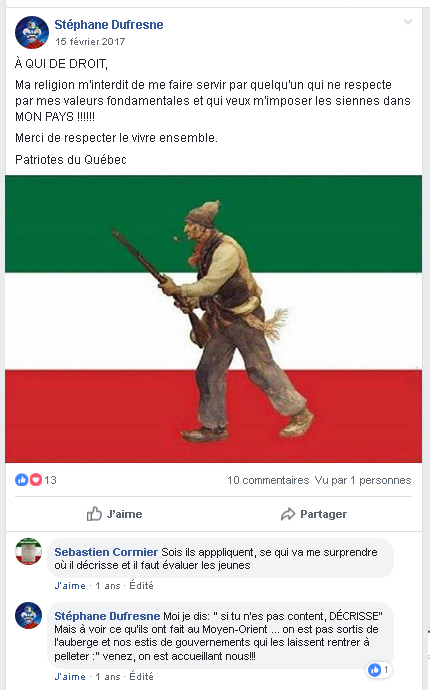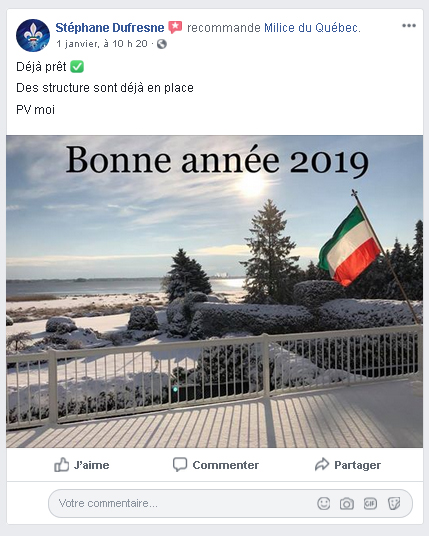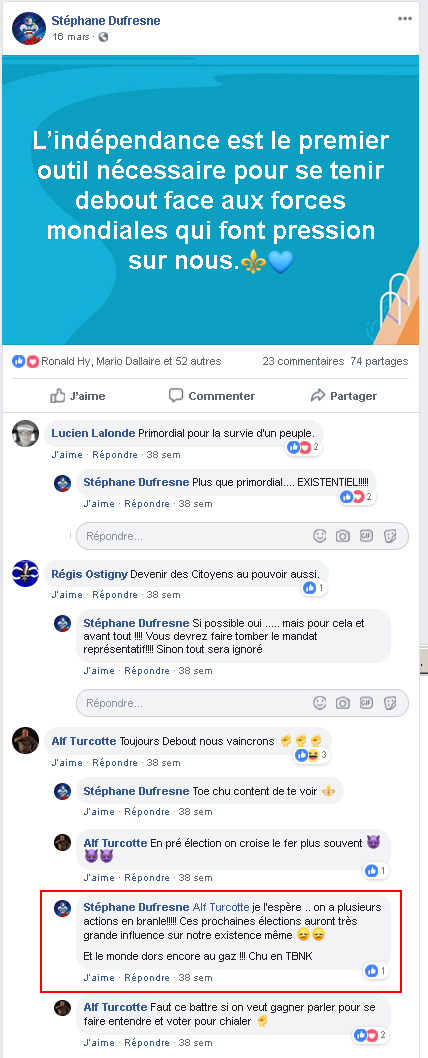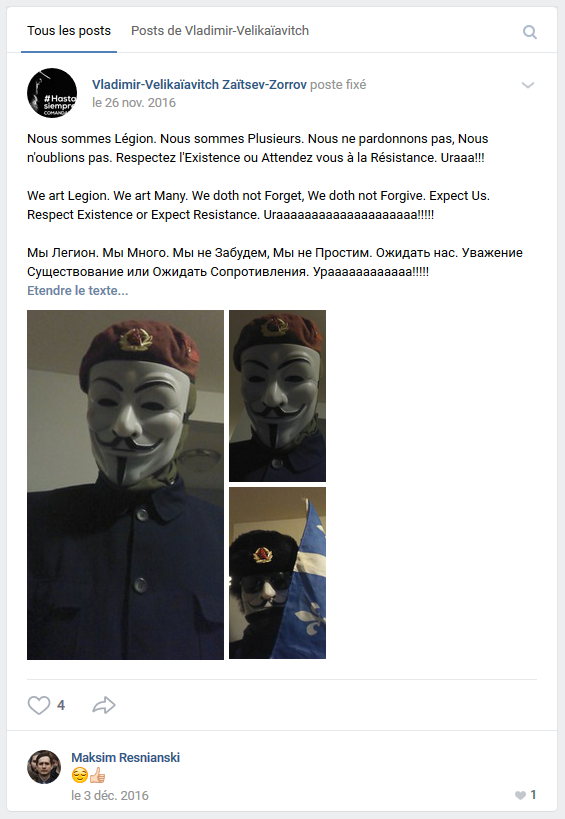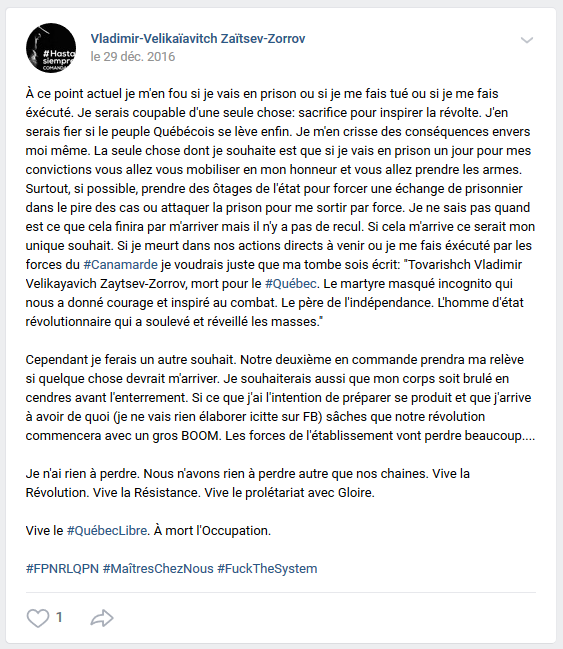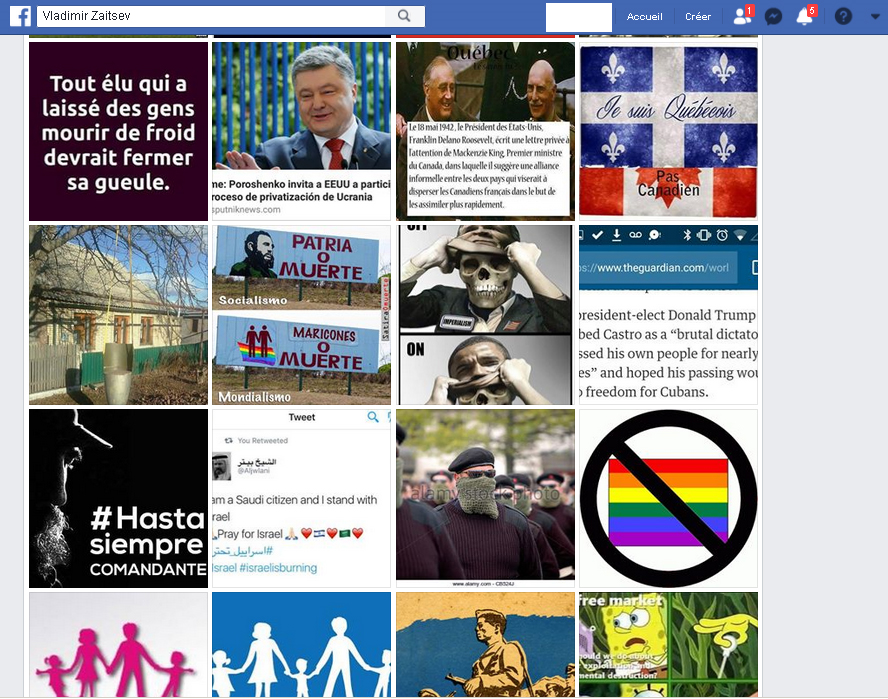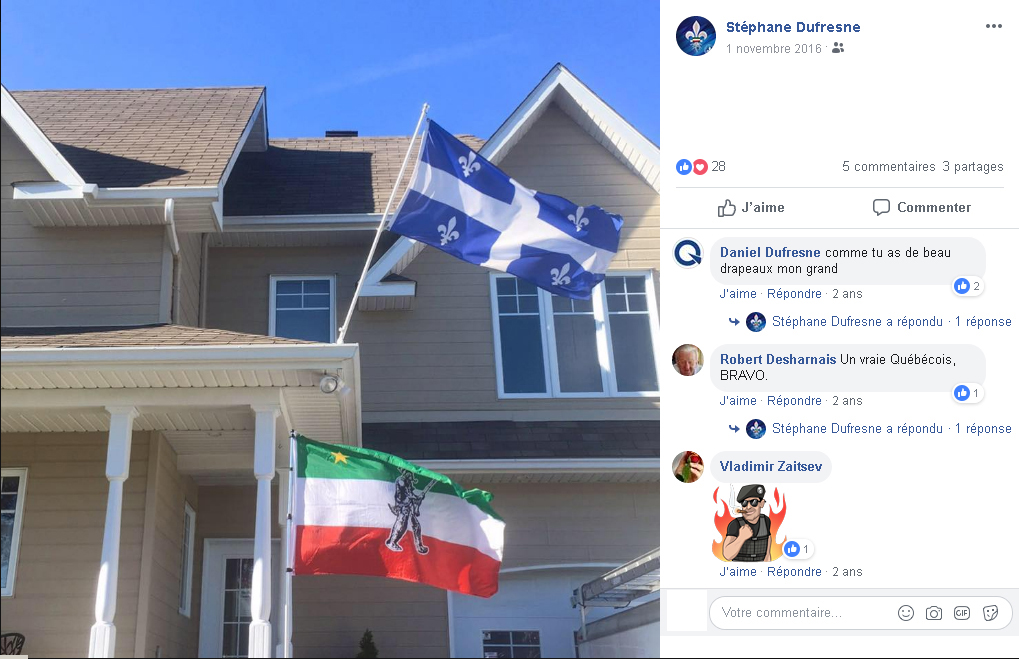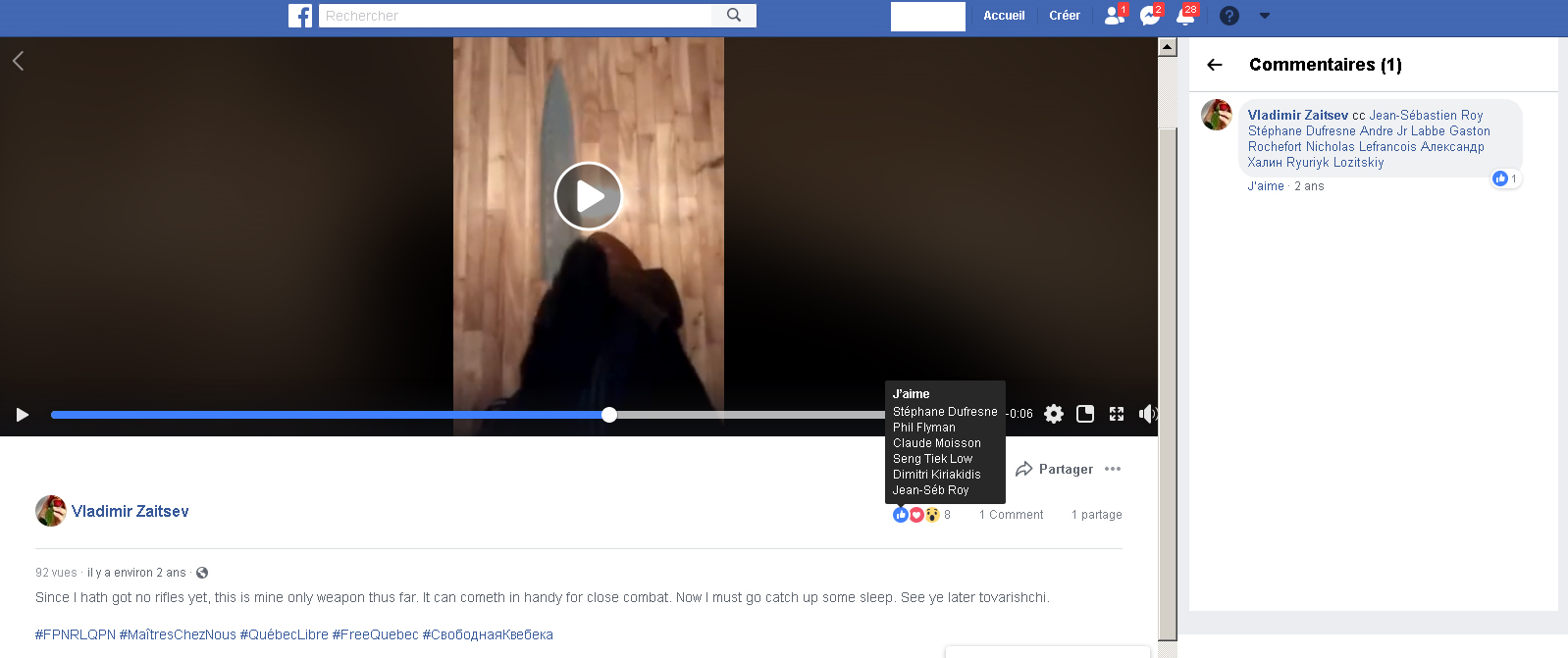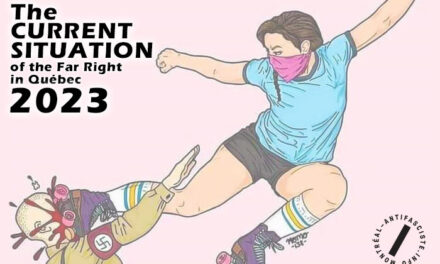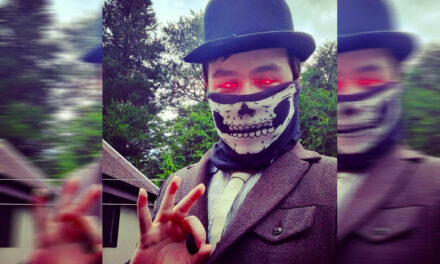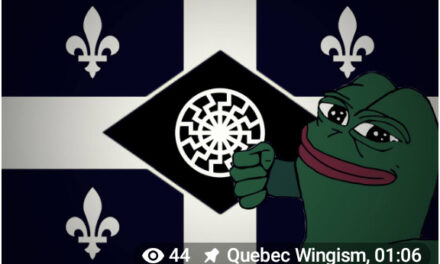It would have been easy to miss a story that barely made the news last year – the story of Stéphane Dufresne (III% Québec, Front patriotique du Québec) and his leaked chat discussion about the need for a “fake terrorist attack,” along with his multiple allusions to having mysterious “concrete plans.” Although the story broke online early in 2018, the only response from the mainstream media was an article in the Montreal Gazette six months later. Montreal Antifasciste was able to establish a direct link between Stéphane Dufresne and a person that that was suspected by the RCMP of attempting to import weapons to Canada for terrorism-related plans. The context of this story is worrying, to say the least, and so we feel Dufresne merits a closer look.
The chat room leak
It all started in March 2018, when it was revealed on Le Troupeau’s Twitter that a discussion between a somewhat strange mix of folks from the far-right had been leaked from a private chat room called “Patriotes du Québec” on the MeWe platform (MeWe being a sort of imitation-Facebook). A user named “Phénix le Patriote” (who later changed his handle to “Stéphane le Patriote”) let drop a bombshell, saying: “We need a fake terrorist attack to wake up the fucking sleepyheads,” to which user “Heinrich Himmler” (!) replied: “Yeah… but be super careful.” It is always difficult to discern empty talk or posturing from actual possible action, but Phénix’s reply seems to point to real plans for an attack: “Yes obviously!!!!! Don’t worry… Multiple actions are coming up”.
In the same chat room, Phénix boasts of his shooting skills and that he is training in KravMaga, an amalgam of different martial arts techniques.
Who was in the chat room?
So who are the people in this private chat? Phénix le Patriote, who changed his handle during the chat to Stéphane Le Patriote, leaves a trail of clues exposed by Le Troupeau’s leak. The most obvious one being that he posts a picture of himself in the group chat, and then later also posts a picture of himself in the same clothes, under his personal Facebook account (Stéphane Dufresne):
Taking a look at Stéphane Dufresne’s Facebook account, we can see that his profile also features the name “Patriote”, just like his MeWe account:
And that he takes KravMaga classes in Joliette:
Joliette also matches up with the target practice photos from above, which, if we zoom in on the logo, we can see are from the Club de Tir de Lanaudière, located in Joliette, QC:
The jacket was also key to identifying him from protests that he has attended (see below), since he is never without his Patriotes patch on one arm (and his Québec flag patch on the other), like here at the “Tout le monde se lève contre le PLQ” protest in Montréal last April 23, 2017.
So that settles it for Dufresne, but what about the others in the chat room? The person using the alias “Heimlich Himmler” (named after the high-ranking Nazi official, one of the main architects of the Holocaust), who advises Dufresne to “be super careful,” was also easy to identify, since Dufresne refers to him by name: “Alan kovak”:
Alan Kovak (real name: Martin Minna) is known for hanging out with Atalante members, as seen here in his Facebook post with Shawn Beauvais-MacDonald and others after a night out putting up anti-leftist posters around Montréal in January 2017:
Or showing off what might be his tattoos…
He also used his real face pic in the MeWe chat room:
… and also is probably referring to how he fucked up by posting the Atalante crew’s image above, which was used by antifascists to identify him and others as authors of Atalante’s 2018 anti-leftist postering run, when he says “I got caught when I did a little job with Atalante… Next time it’ll be ultra secret”:
Screenshots also show that Lucien Lalonde and Carl Blanchette were participating in the chat room; these two are both members or associates of the Front patriotique du Québec. Lalonde has a penchant for macho talk, for instance in this screenshot from August 2017 where he suggests using an AK-47 as a “solution” to deal with migrants (many of them refugees originally from Haiti) who were crossing the border at the time:
Portrait of Stéphane Dufresne
Taking a closer look at Stéphane Dufresne, as there is a lot that can be learned from his online activity.
We can see above that although he works for la Société de reconstitution du Bas-Canada, re-enacting the Patriotes Rebellions of 1837-8, he also runs a construction business, “Constructions Stepco”, out of his home address in Saint-Charles-Borromée, on the outskirts of Joliette, QC.:
Life is good in Saint-Charles-Borromée, although he doesn’t seem super pleased about the new house that was built alongside his backyard, talking about how he’s “on the verge of setting it on fire”:
His Facebook likes (below) reveal that he is a strong supporter of “hardcore” Québec nationalism, from the Front patriotique du Québec (the group he is most active with) all the way to the white supremacist Fédération des Québécois de souche, as well as not one but four self-styled militia groups: Milice du Québec, Milice Québecoise des Droits et Libertés du Québec, Milice Patriotique Québécoise, and Milice Patriotique du Québec (and this is not including the III% Québec group he is part of). (Click on the image to enlarge). None of which stops him from also being a strong supporter of the Parti Québécois, like most other members of the FPQ.
Dufresne is not only an active member of the Front patriotique du Québec, he is an administrator (and active contributor) to their Facebook group. One can only wonder if the FPQ’s poorly attended events, and the rapidly ageing profile of the dozen or so people who do show up, are possibly a factor in him repeatedly referring to the need to wake up the population.
Dufresne has also become very active with III% Québec; he shows up consistently to do security with them at events, wandering around tepid, poorly attended protests in camouflage clothing, taking part in their group photos… at one point he even looks like he’s trying to throw up the III% hand sign in the group photo below:
The III% is an armed militia group which was started in the USA in 2008. The Canadian III%, although they describe themselves as “patriots… standing up for our rights,” are mostly concerned with two issues: what they see as the “invasion of Islam” into Canada (much like most other far-right groups), and firearms. Most group chapters require members to have a Possession and Acquisition Licence (a gun permit), and the group operates in a hierarchy imitating that of the military. The III% (also referred to as Threepers) most often show up to provide security for far-right Islamophobic speakers or events, such as for Faith Goldy or La Meute. In Québec, many members of the group signaled their involvement in the 2017 (failed) plan to hold a pro-gun rally at the park commemorating the Polytechnique anti-feminist massacre, on the anniversary of the killings of 14 women there (the failed rally’s organizer, Guy Morin, was also a member of the III% Québec Facebook group).
The irony must not be lost on Dufresne that he is now an active member of the III%, a pan-Canadian patriot group, which is patriotic towards… Canada. One can only imagine his grimace (pictured below), standing in front of the Parliament of Canada with his proud Threeper bros and a Canadian flag in front, when his whole raison d’être seems to be a violent uprising to win Québec’s independence from Canada.
Dufresne is also a member of La Meute’s secret Facebook group, even though La Meute spokesman Sylvain Brouillette made a point of saying that he’s “not the type of person we’re looking for as a member,” in the aforementioned Montreal Gazette article.
Protests… and more protests
Dufresne is probably one of the most, if not THE most, prolific individuals at far-right protests in Québec. Although he started out as a bit of a floater, showing up with La Meute (“Contre la motion M-103”, March 4, 2017), alongside the Soldiers of Odin (trying to intimidate people at the “Learn to Resist” weekend at Concordia, March 25, 2017), or with random Islamophobes (outside the Ahlillbait mosque in Montréal, December 15, 2017), in 2018 he seemed to have settled down to doing security with the III% (“Unis pour la protection des frontiers” at the Lacolle border, “Dehors les libéraux” in Montréal, or against the UN migration compact in Ottawa).
Dufresne’s online chatter
It becomes apparent, while looking through Dufresne’s online posts, that he is severely disappointed in the state of the Québec independence movement. The following exchange, after the protest against Bill M-103, is a representative example: “I get the impression Québec is finished… They found a way to crush us.” “We’re fucked.” Near the bottom of the chat he says “We need to get out our ‘teaser’ to wake up a shitload of them” (“teaser” possibly means Taser gun).
He also displays the xenophobia that is prevalent in far-right circles, as in the following exchange where he declares that “my religion forbids me from being served by someone who doesn’t respect my fundamental values and who wants to impose their own in MY COUNTRY!!!!,” followed by “what I say is, if you’re not happy GET THE FUCK OUT. Seeing what they did in the Middle East… We’re not out of the woods yet with our fucking governments shovelling them in…”Dufresne is also clearly dedicated to the idea that there needs to be a militia in Québec. The below conversation contains a couple of his recurring themes: disappointment in the current state of things, plans he has, and the need for a militia. He starts with “Geez, we are really at the point where we have to justify our existence in our own country? Things have gotten bad.” Once again, he says, “We should buy some ‘teaser’ because people are sleepy as fuck.” Later in the discussion, he says, “It’s time for a Québecois brigade (militia).” Later in the thread, Martin Bédard posts a video of the Milice Patriotique Québécoise, a now defunct armed militia that existed until recently, and was headed by far-right militant Serge Provost. Dufresne replies “I already saw that, I tried to contact Serge Provost last fall.”
He also posted that he is “already ready” to the Milice du Québec Facebook group, following up with “structures are already in place. PM me for details”.
He repeatedly refers to having plans, as in the following exchange where Alf Turcotte says, “Before the elections we’ll fight even more,” to which Dufresne replies, “I hope so… I have multiple actions ready to go!!!! These next elections will have a huge impact on our existence… And people are still asleep at the wheel! I’m raging”
Or, as was revealed by Le Troupeau, his exchange with Dave Tregget (ex-leader of Soldiers of Odin Québec and founder of Storm Alliance), where he says, “Dave, we have some projects that are ready to go… Let’s see what gives J”, to which Tregget replies “We need to talk about it Stéphane,” and Dufresne replies “J real soon”.
From the above chats we see Dufresne is someone disillusioned with the decline of the independence movement, who wants to shock people awake, who is hoping to start or join a Québécois militia, and who makes allusions to having multiple “plans.”
Connections to a person arrested under terrorism-related charges
In 2017, the RCMP was alerted by US authorities that a Montrealer named Alexandre Louis Fallara was attempting to bring in arms from the USA. Further investigation uncovered that Fallara was not just a nationalist but also some sort of “National Bolshevik”, or “Nazbol”, who was posting a wide range of comments online stating he was ready to kill others or sacrifice himself for Québec.
While historically, National Bolshevism refers to a tendency within the international communist movement, in the context of contemporary antifascism, National Bolshevism (often referred to as “Nazbol”) is a strain of neo-fascism that emerged following the fall of the Soviet Union, shepherded into existence in part by elements within the former Soviet state security services. Nazbols take on the symbols of, and identify with, selective parts of the history of the communist and anti-imperialist movements, often with an emphasis on the Stalin era and Anti-Zionism in their crudest forms. The social and internationalist content of these movements is downplayed or distorted, while the conservative and xenophobic aspects of their history are emphasized and are often reframed within a racist narrative. National Bolshevism is a highly eclectic ideology; today its main expressions include extreme nationalism, opposition to “mass immigration” (especially of Muslims into Europe), anti-Americanism, and being against “western liberalism” or decadence, which translates as being against Jewish and LGBTQ people. While not identical, it overlaps with Aleksandr Dugin’s “Fourth Position” ideology, and both have been encouraged by elements of the Russian State under Vladimir Putin.
As was reported in a La Presse article last year, the RCMP picked up Fallara under Article 810.2 (3) of the Criminal Code, which is used as a way for authorities to impose conditions on someone that they fear will commit a serious offense, even though the person may not have done anything criminal as of yet. His conditions included being prohibited from possessing firearms, explosives, or what they described as “terrorist material”. (While we are completely opposed to what we know of Fallara’s politics, the repressive implications of this state tool and the conditions imposed should be obvious to readers).
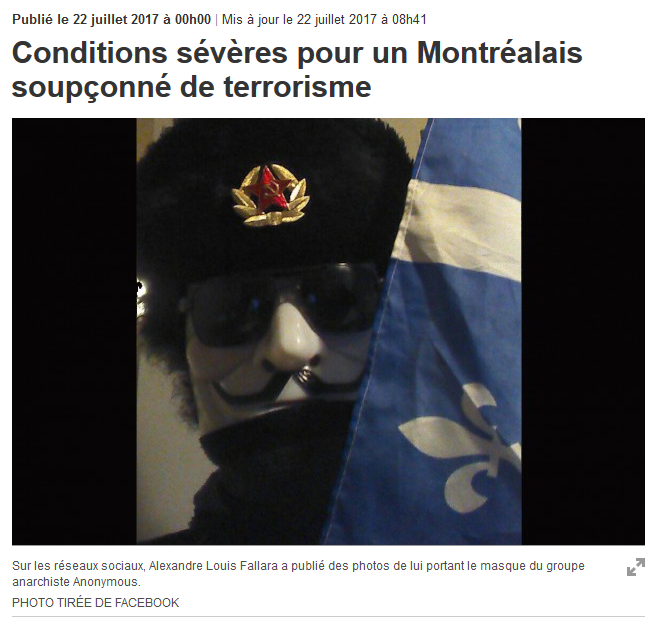
Screenshot of the La Presse article reads “Severe conditions placed on Montrealer suspected of terrorism.”
Buried near the end of the article, it was mentioned that Fallara was also banned from speaking to his friend, Stéphane Dufresne. This led us to wonder: was this the same Stéphane Dufresne as the person this article is about?
Fortunately, Fallara’s Facebook and VK.com accounts are still online and uncensored (he was banned from using social media, but his accounts have remained intact since the date of the trial). On his VK.com profile, he uses the alias Vladimir-Velikayavich Zaytsev-Zorrov, where we can see him in the same outfit as in the photo La Presse used to illustrate their article.
His VK.com profile still features a large number of call-to-arms type posts, such as the following, where he states that he “doesn’t care if he goes to prison or gets killed or executed. I will be proud if the Québécois people finally rise up”. He also mysteriously mentions “I have another wish. My second in command will pick up the baton if something happens to me”. Later in the post he also says “If what I’m preparing comes to fruition and I manage something (I’m not going to elaborate here on FB), know that our revolution will start with a huge BOOM.”
He shortened his name to “Vladimir Zaitsev” on Facebook, which is still online as he left it before he was banned from using the internet. It is filled with his own toxic blend of Québec nationalism, Islamophobia, and homophobia.
And, as it would happen, it turns out that he was indeed friends with our Stéphane Dufresne: We can see Fallara commenting on a private photo Dufresne posted of the front of his house.
In fact, they seem to be quite good friends, tagging each other in multiple posts, such as the following, which Dufresne was tagged in, where they refer to each other as “tovarisch,” which translates to comrade, or friend.
Or another, where Fallara indicates that he is “with Dufresne and 3 other people”, he refers to Dufresne as “one of our most patriotic steadfast comrades.”
As might be expected, they also publicly discuss violent uprisings together, like the following interaction where Fallara asks in Russian “When are we going to war,” to which Dufresne replies: “Currently.”
Dufresne also is tagged in a creepy video of Fallara stabbing the air with a knife, that he says will “come in handy for close combat”. Dufresne “liked” the video.
In another post by Fallara, where he is extolling the virtues of armed uprising (and again tagging Dufresne), we can see Dufresne replying not long after with the comment “Citizen’s militia❤”. Fallara “liked” this reply.
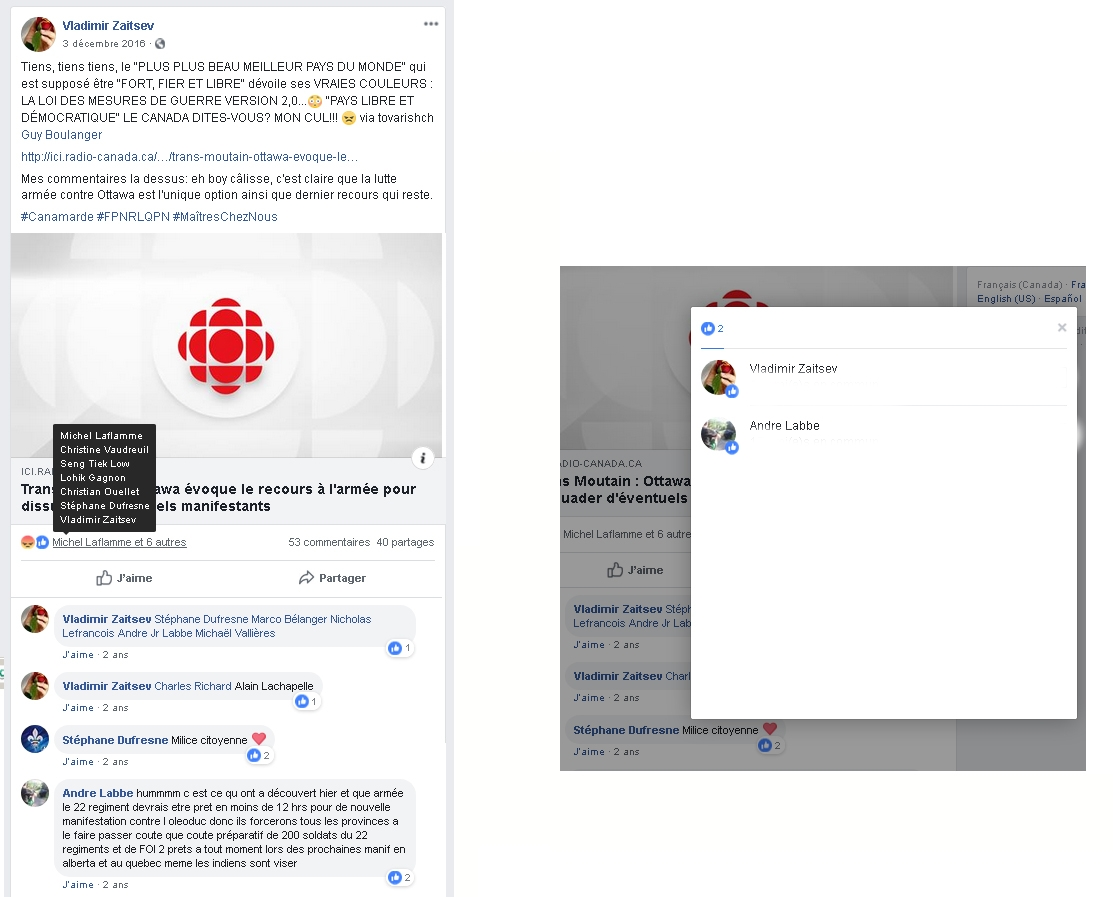
Stéphane Dufresne et Alex Fallara semblent tous les deux avoir une affection particulière pour les milices et les soulèvements armés.
Fallara was picked up by the RCMP and charged under terrorism-related offenses, and one of the conditions of the trial was that he can’t be in touch with his friend Stéphane Dufresne. This brings up some obvious questions, like: Why was Stéphane Dufresne named as someone he wasn’t allowed to associate with? Was Dufresne involved in the same type of activities that Fallara was suspected of planning?
Conclusion
When the Le Troupeau chatroom leak surfaced, it revealed that Stéphane Dufresne was talking about the need for a terrorist attack to wake people up, followed by the assertion that he had “multiple actions coming up.” This in itself was worrying, but a closer look at his online activity shows a man displaying many more warning signs: he is someone who repeatedly states that he wants to wake people up, who practices shooting and street-fighting techniques, who is searching for the perfect Québécois militia (but in the meanwhile has joined a Canada-wide one), and who makes multiple ominous allusions to having “plans.” Dufresne’s name coming up in a non-association clause of a terrorism-related trial makes all of the above even more concerning. The fact that his friend, Alexandre Fallara, was attempting to import arms from the USA and was placed under surveillance by the RCMP, further cements Dufresne as someone who must be monitored closely.
We realize that this story is murky: our own politics run directly counter to the State’s “anti-terrorist” and repressive agenda, which is why we feel the need to carry out our own investigations. We do not rely on State sources, but we cannot exclude what we learn from their investigations and manoeuvres. In a context in which “revolutionary” far-right acts of violence are becoming more and more common, we must remain vigilant, while trying to figure out the answers to the difficult question of what is to be done and how we can most efficiently intervene.
In the broader context, this story is another example of the mixing of scenes and crosspollination on the far-right: in Québec we now consistently have the III% militia providing security at rallies of far-right nationalist groups, and in this case we see neo-Nazis (Martin Minna) planning in private with self-styled “Patriotes”(Dufresne and Lalonde).With the independence movement currently in decline, some proponents have turned to more desperate measures to promote their movement – whether by instrumentalizing islamophobia, or for a much smaller “hard core,” by preparing for violence. What is clear is that the far-right is continuing to fragment and re-form in new ways, and needs to be challenged at every turn.

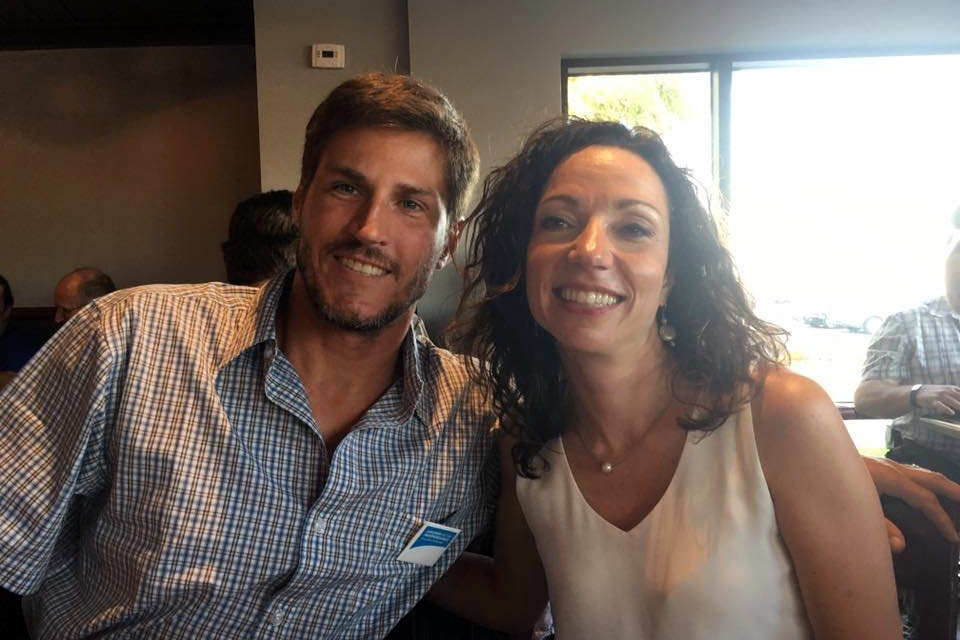
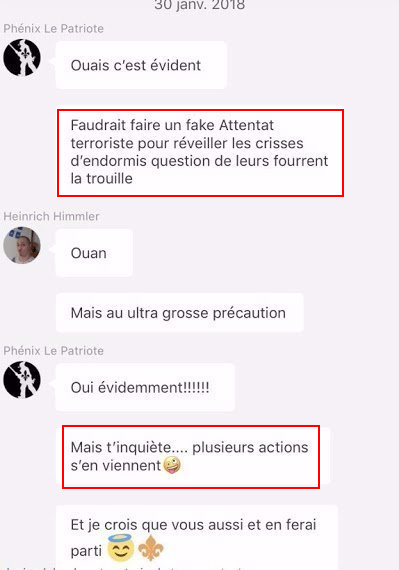
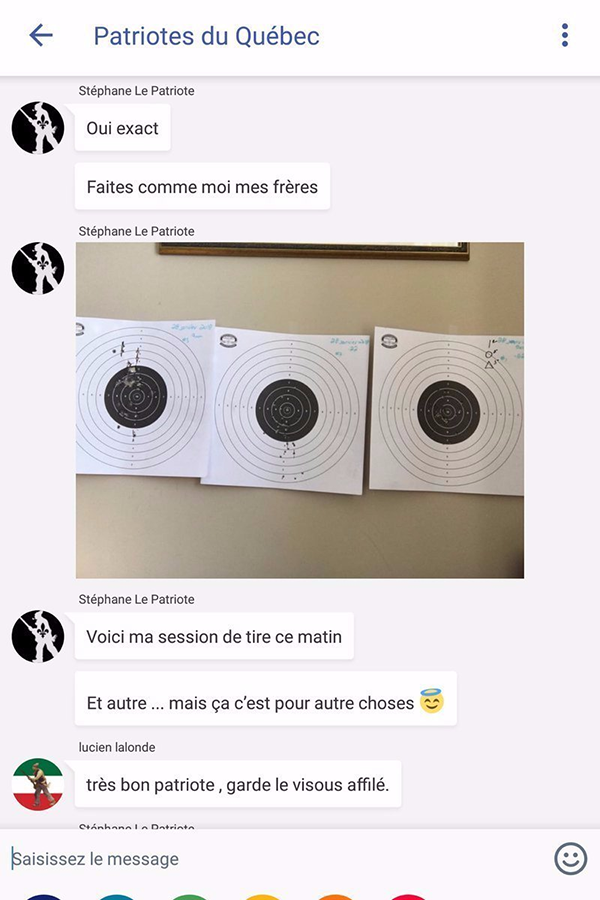
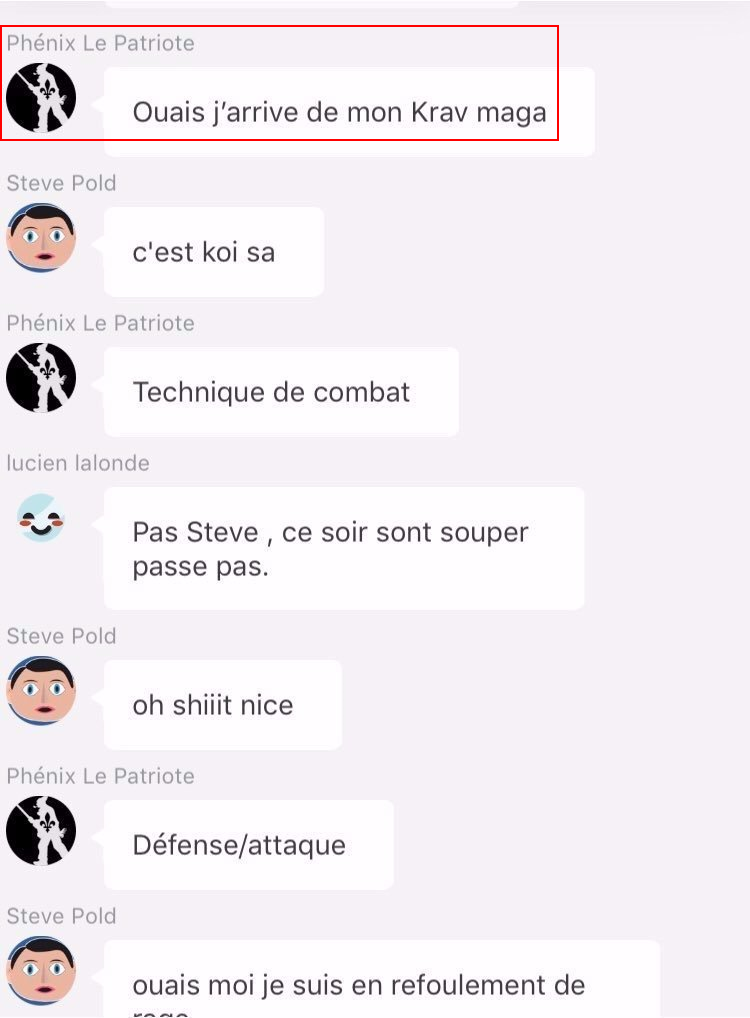
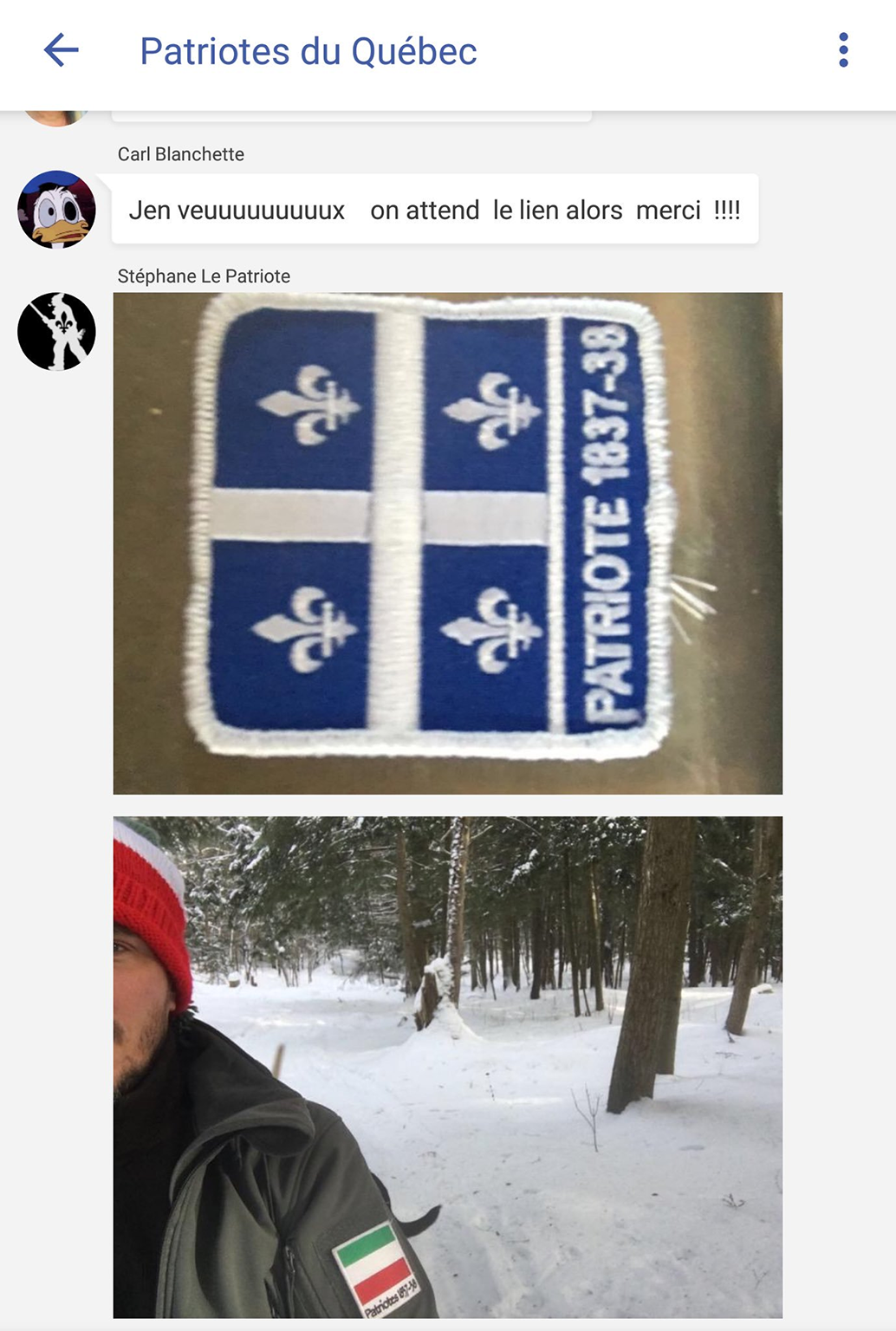
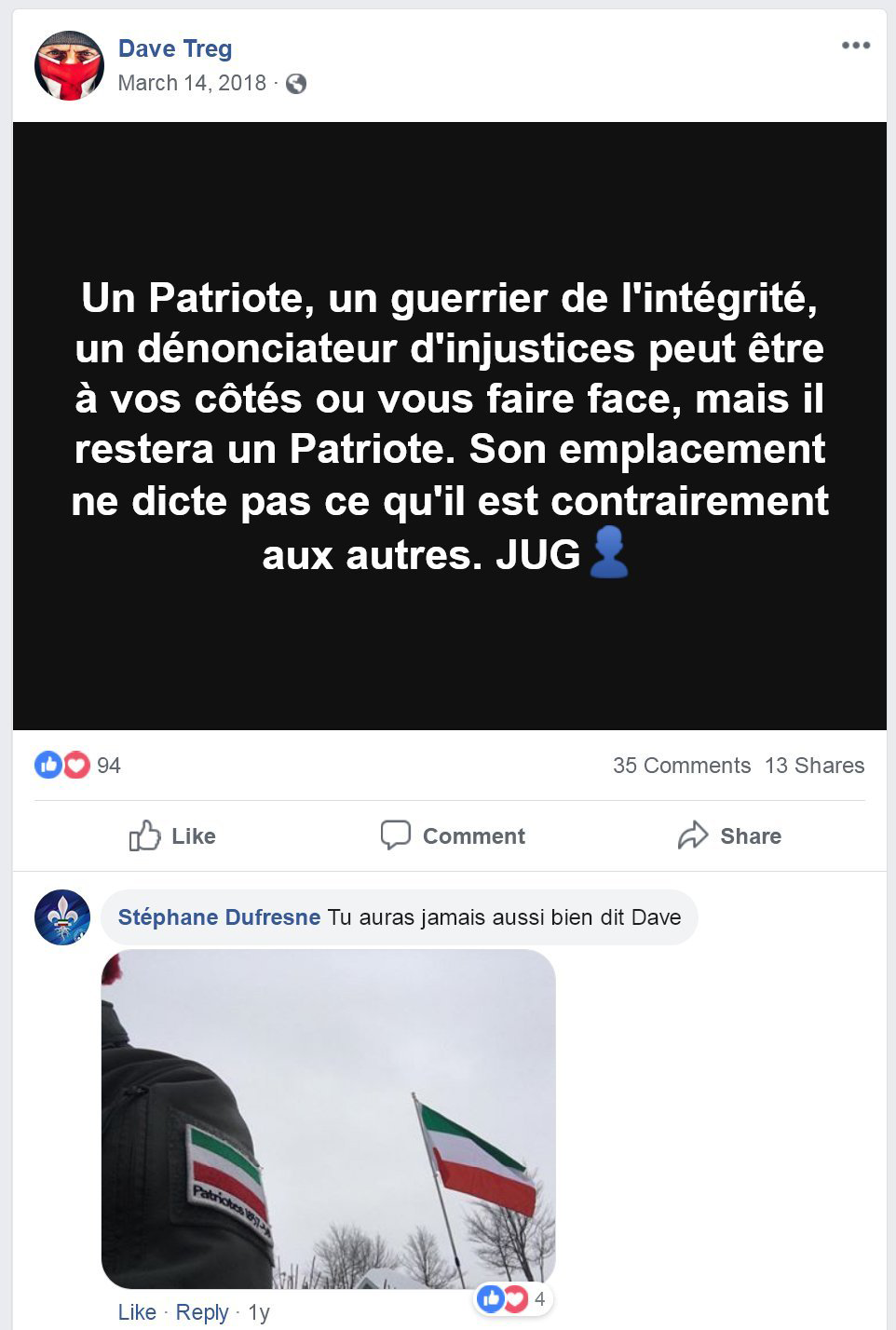
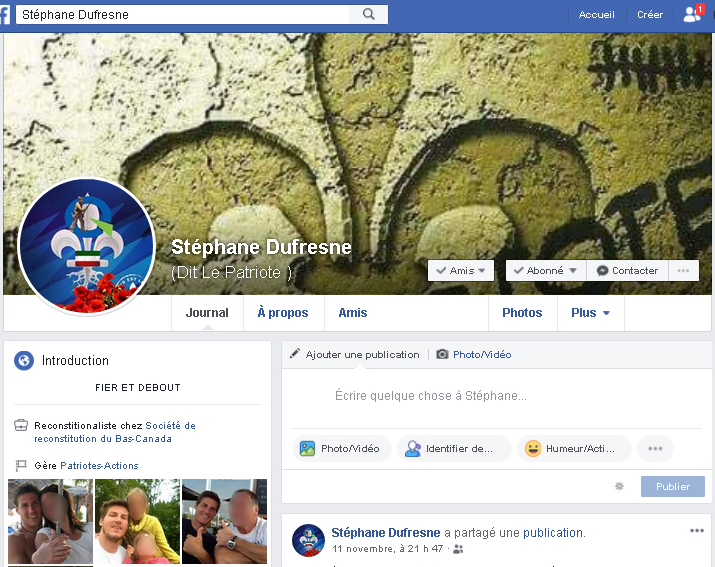
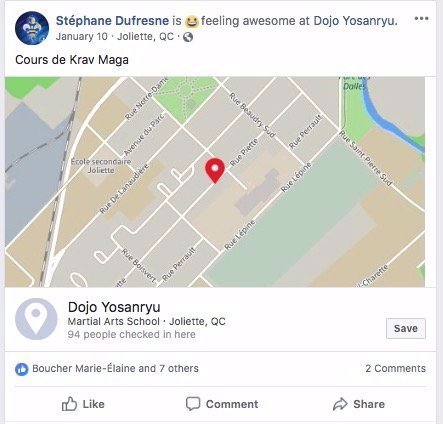
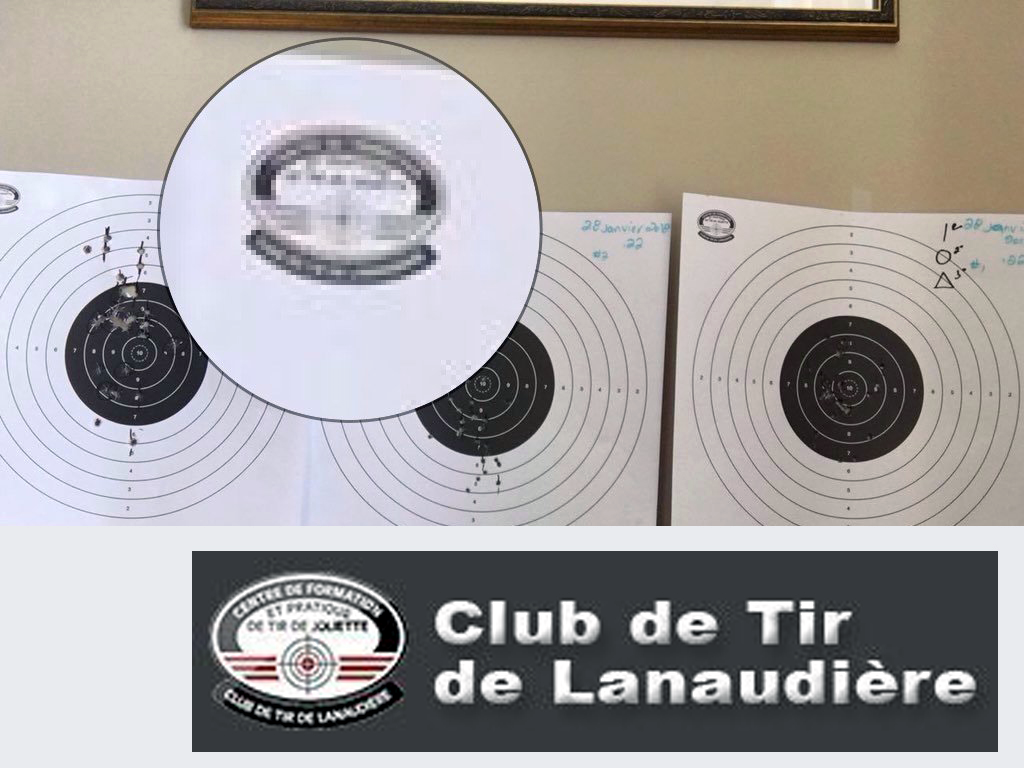
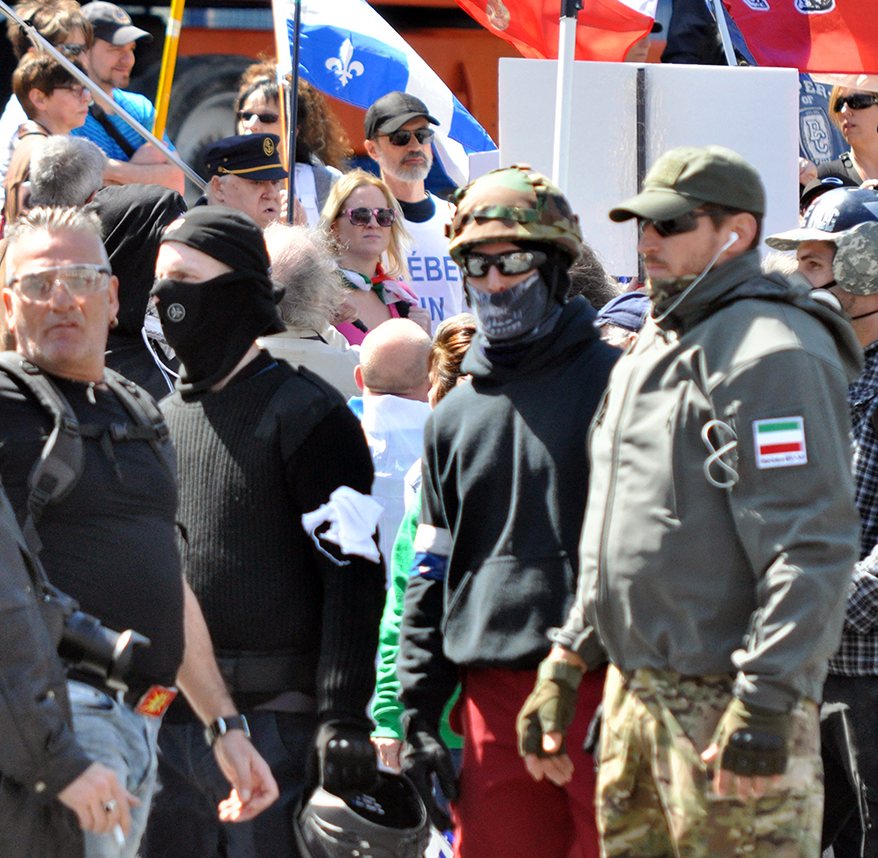
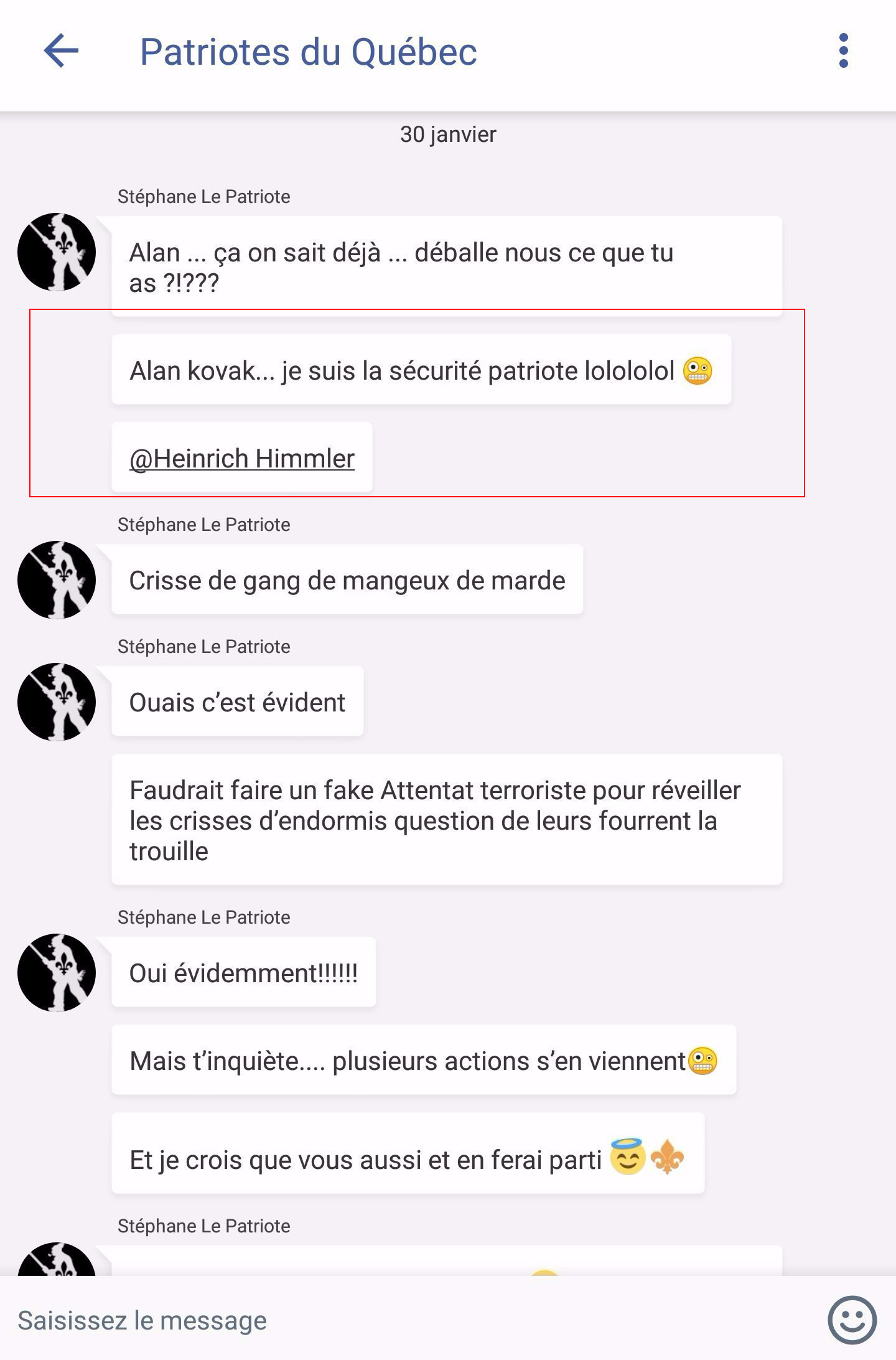
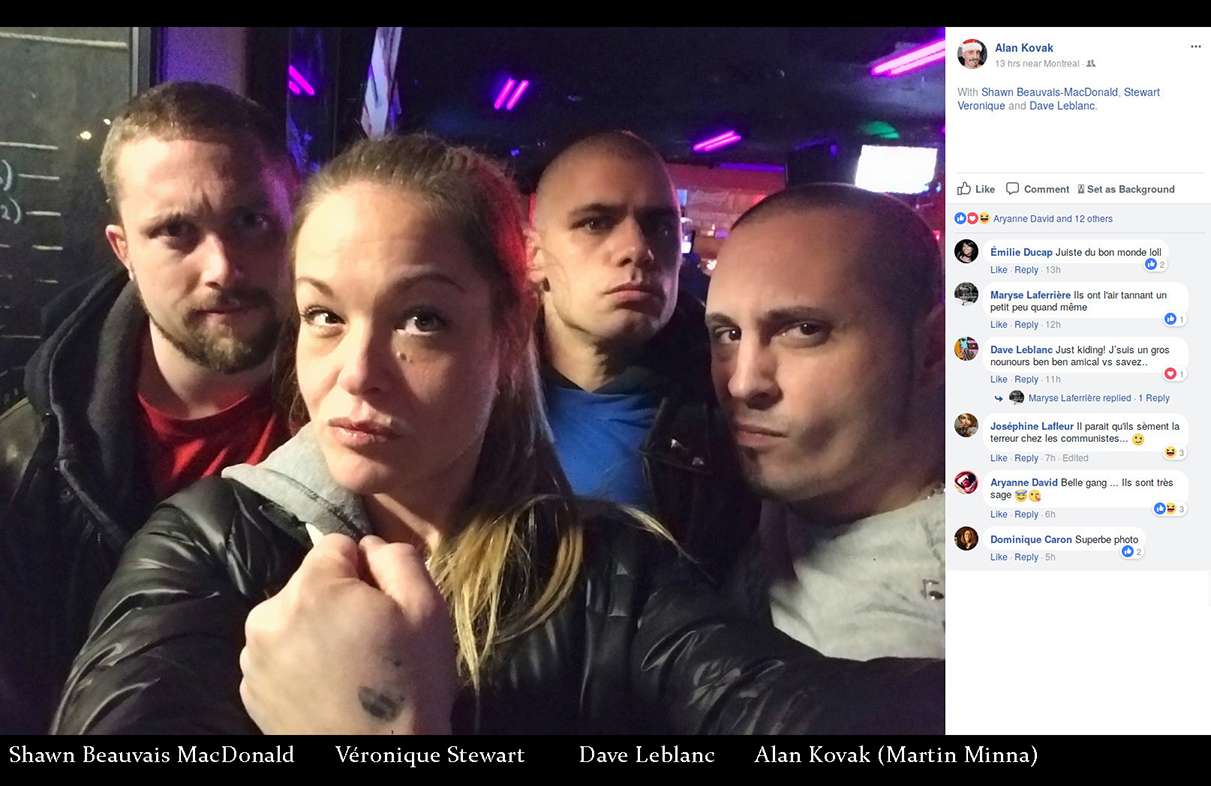
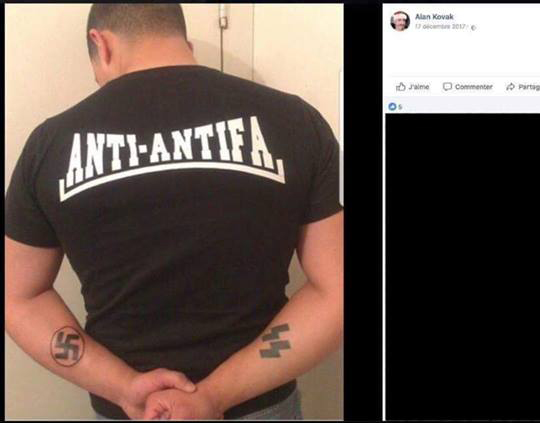
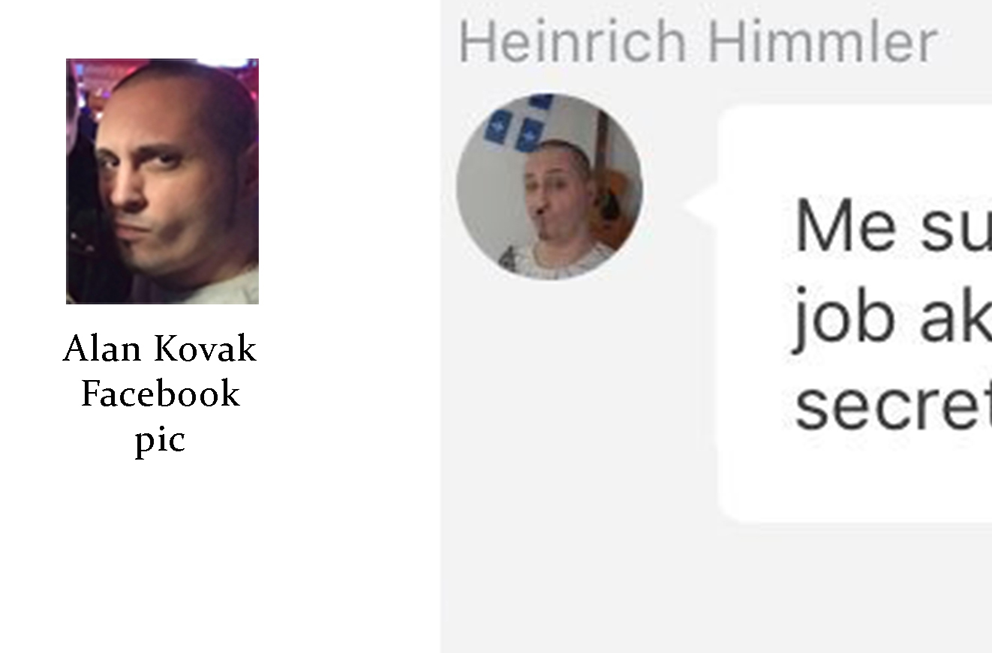
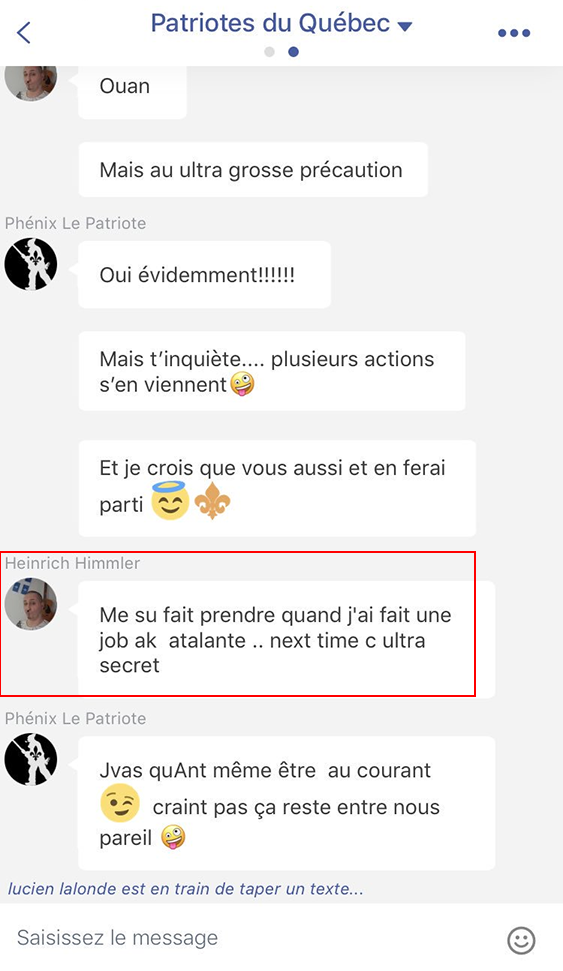
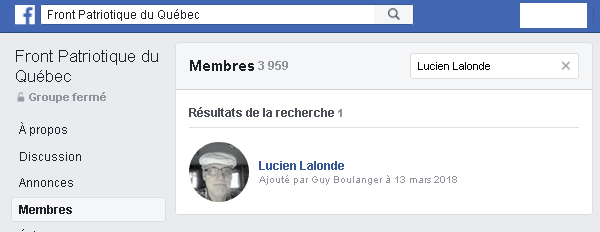
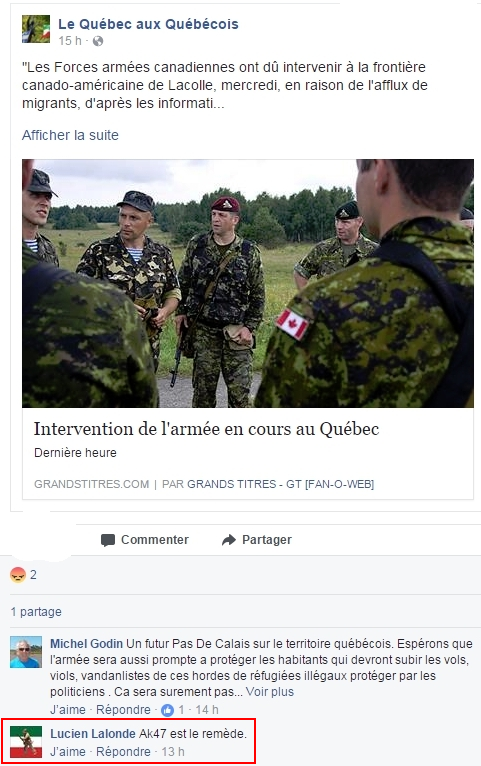
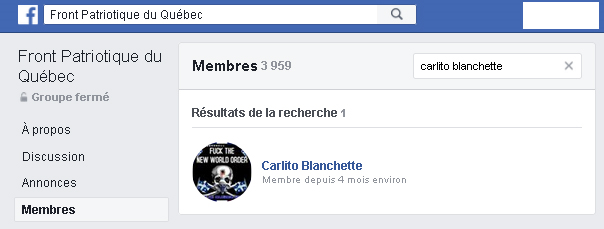
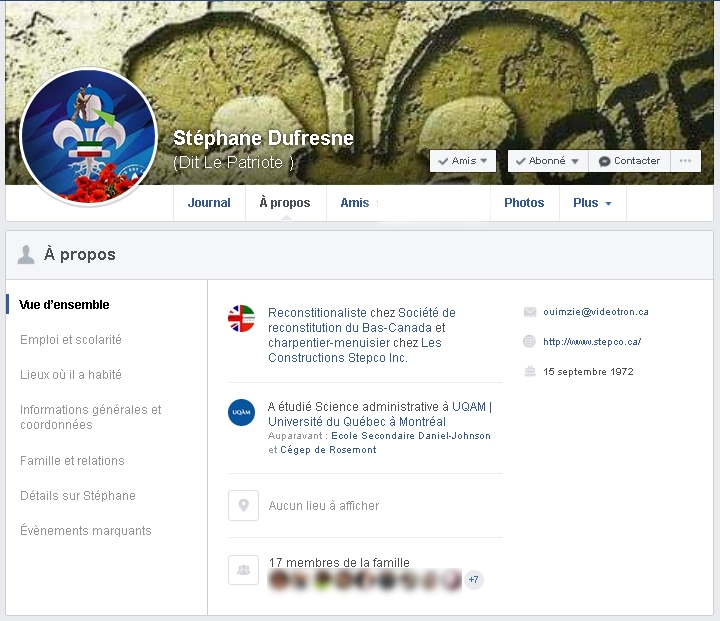
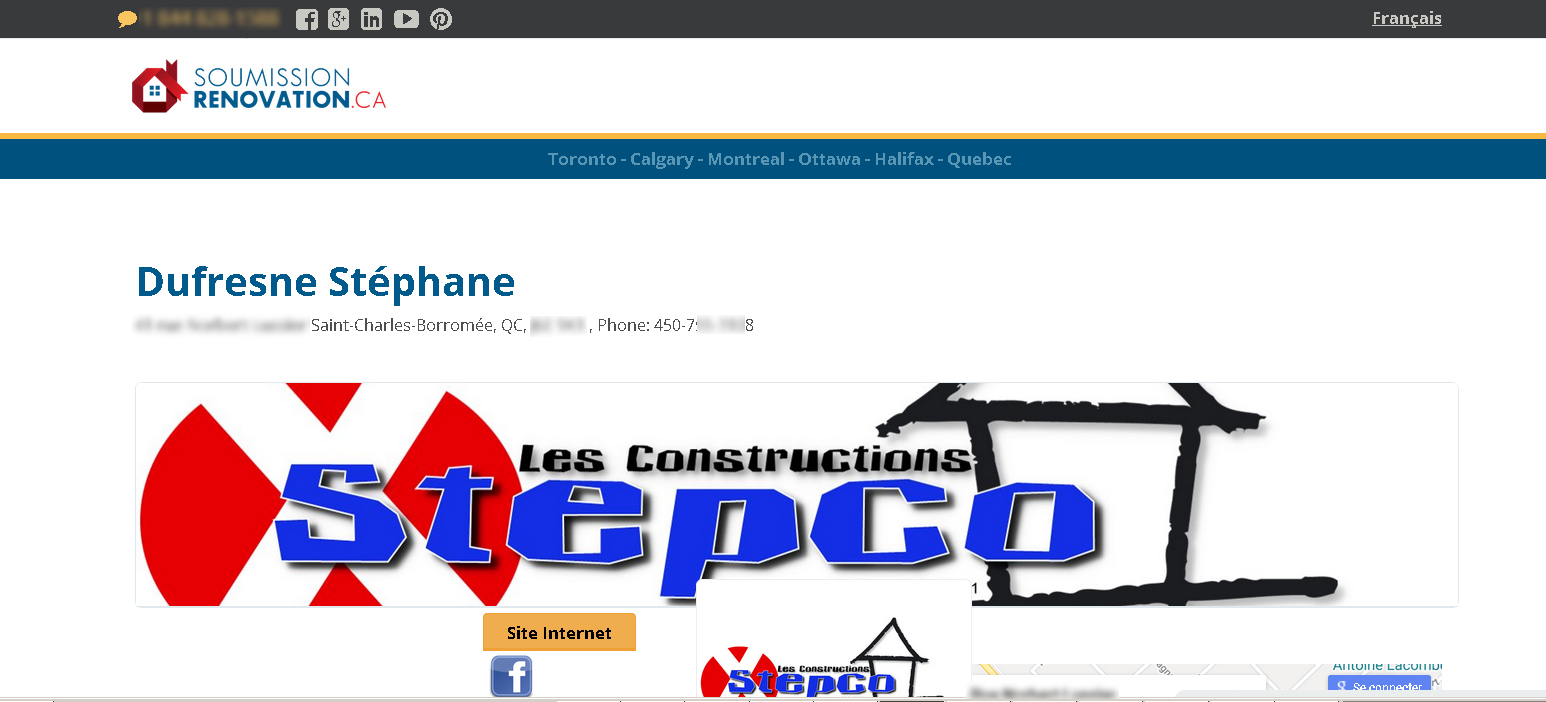
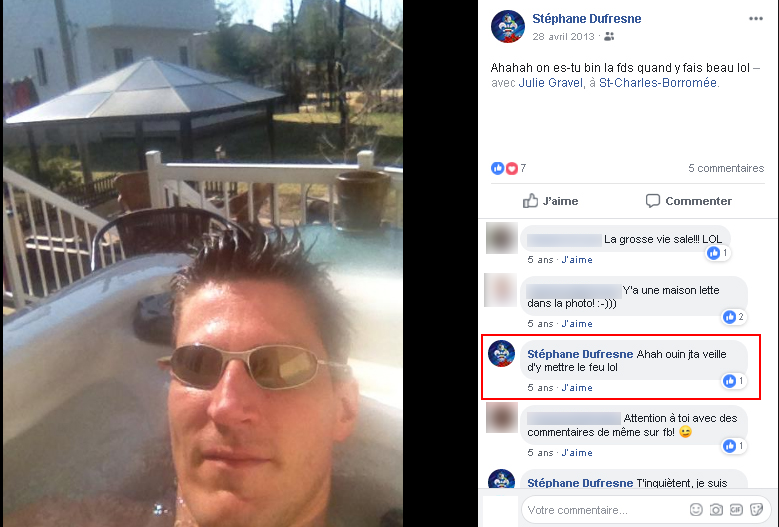
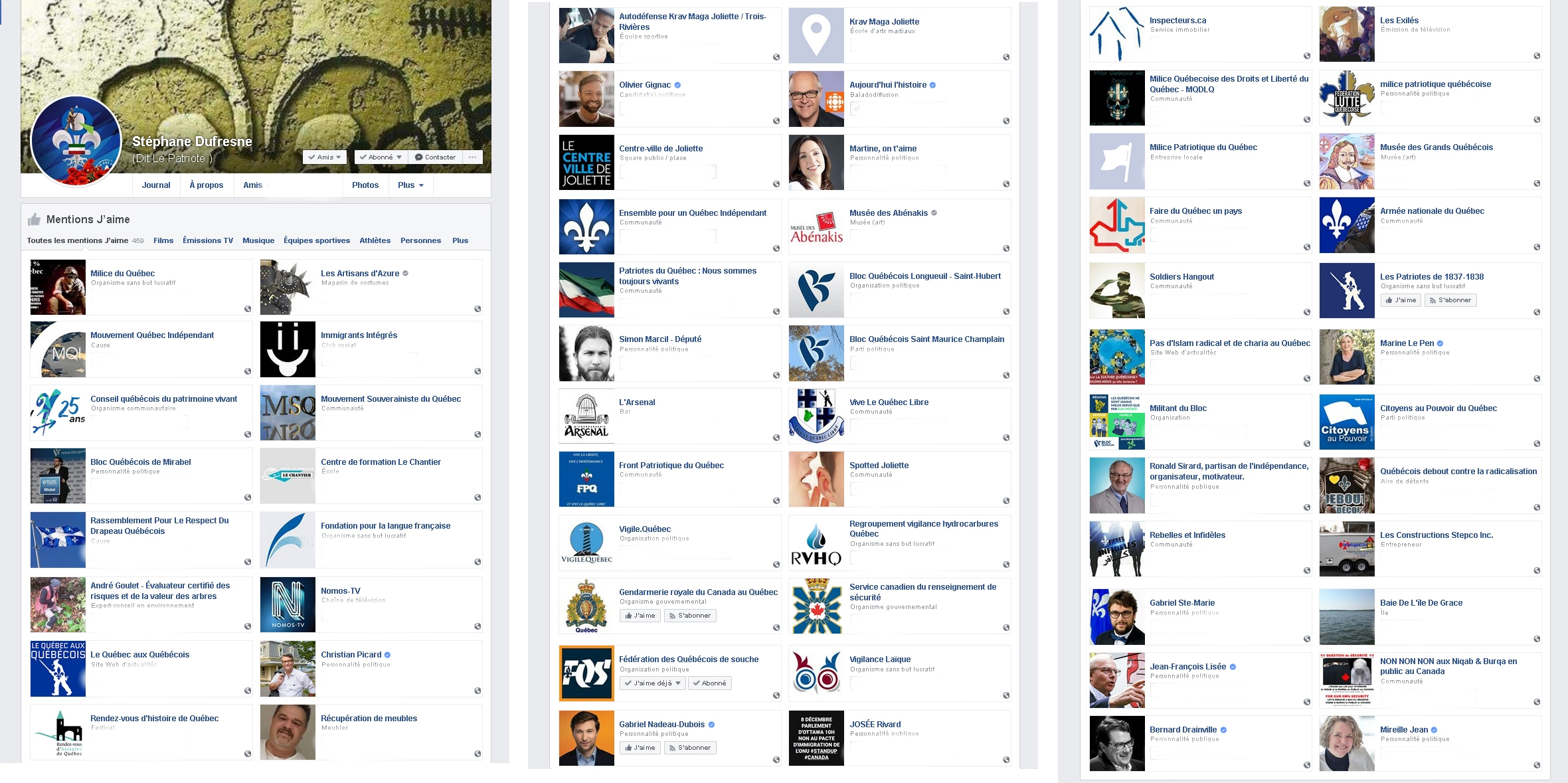
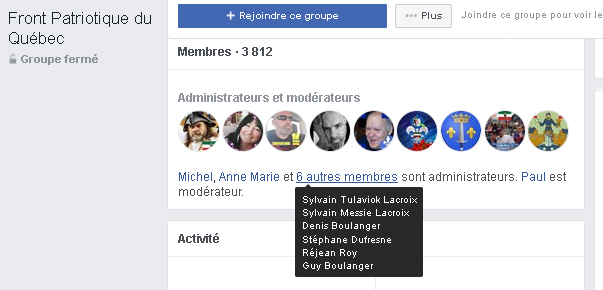
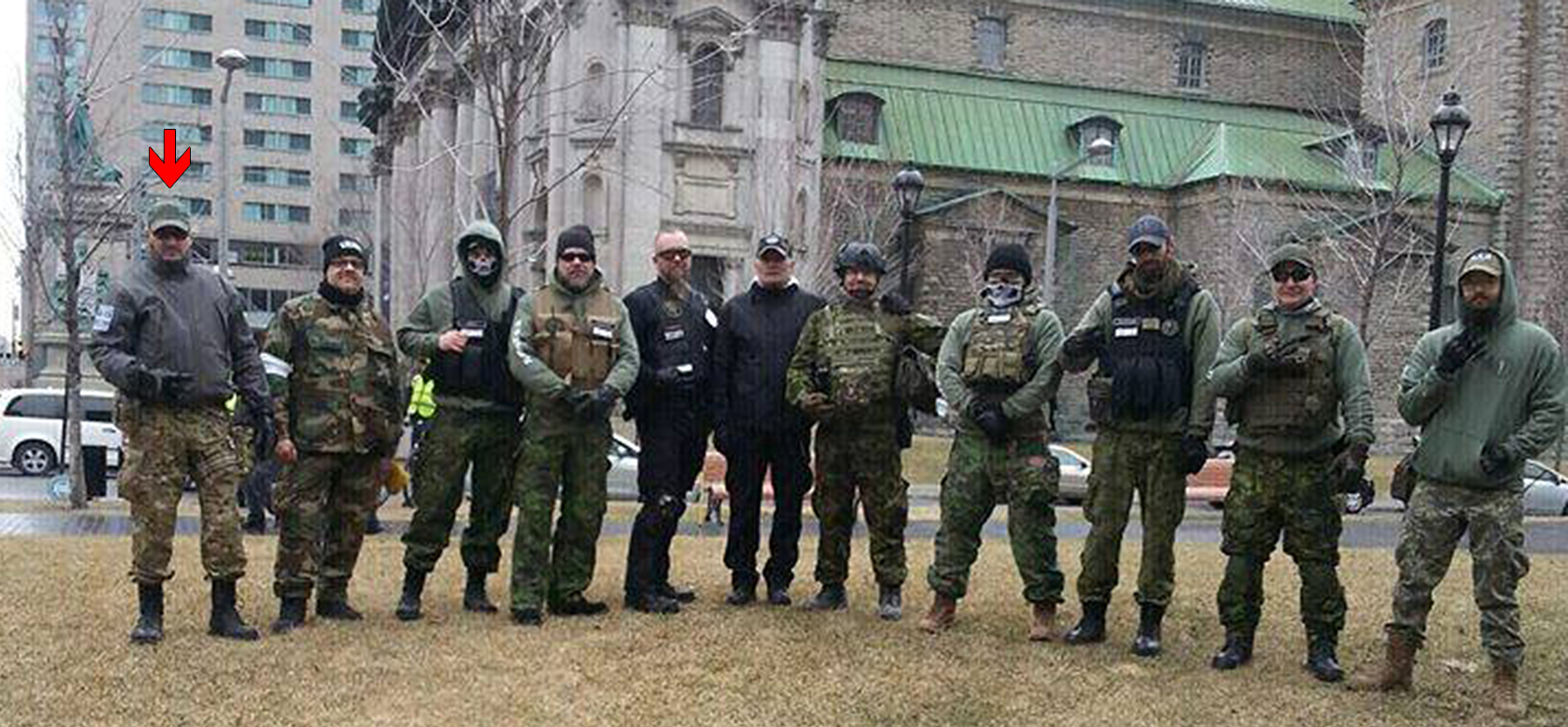

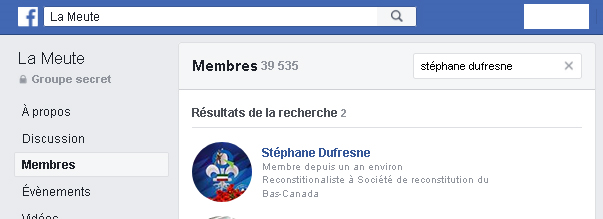
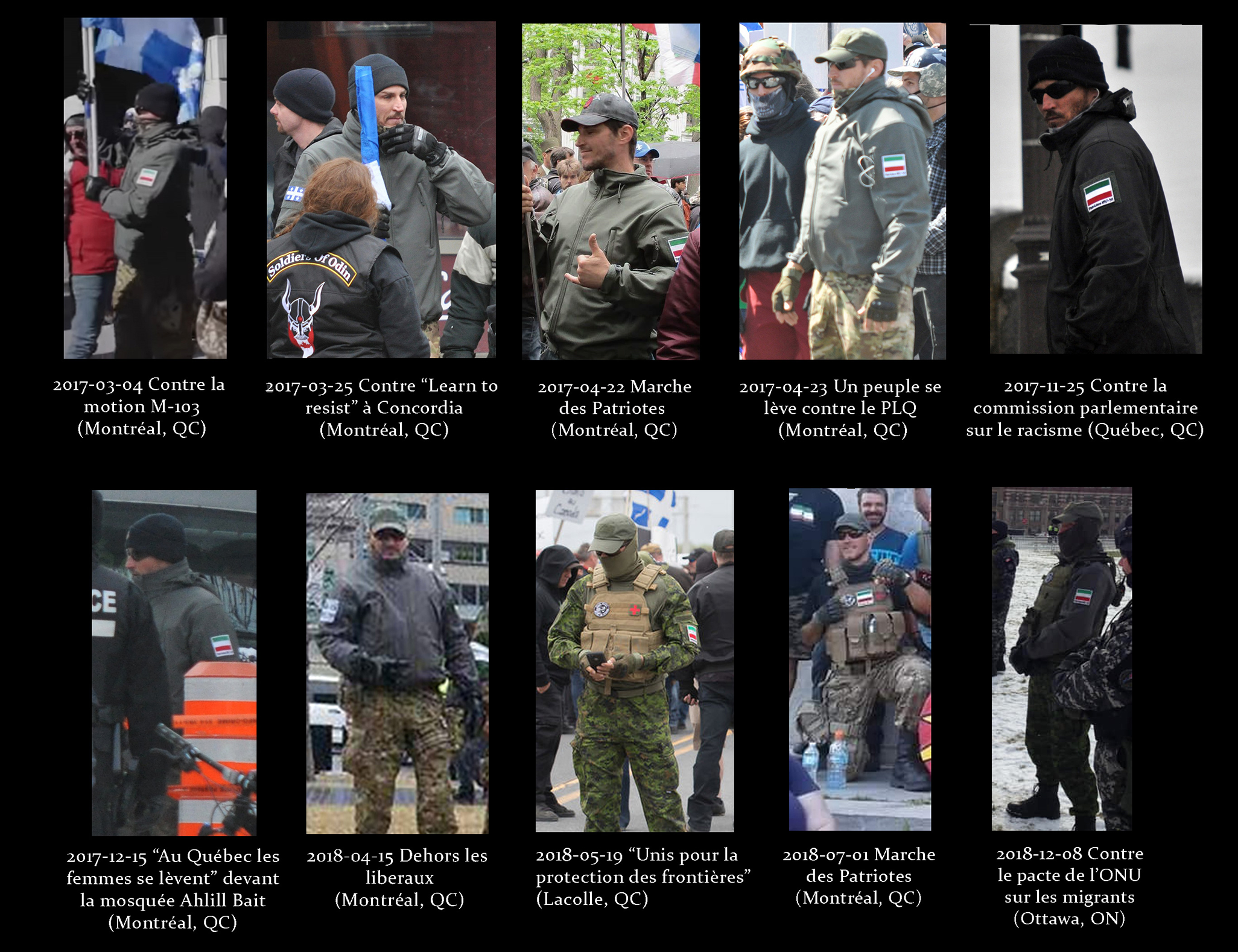
![Dufresne croit qu’il faut sortir les “teasers” [sic] pour en réveiller « une crisse de gang ».](https://montreal-antifasciste.info/wp-content/uploads/2019/04/27-cest_fini_le_quebec2-1.png)
